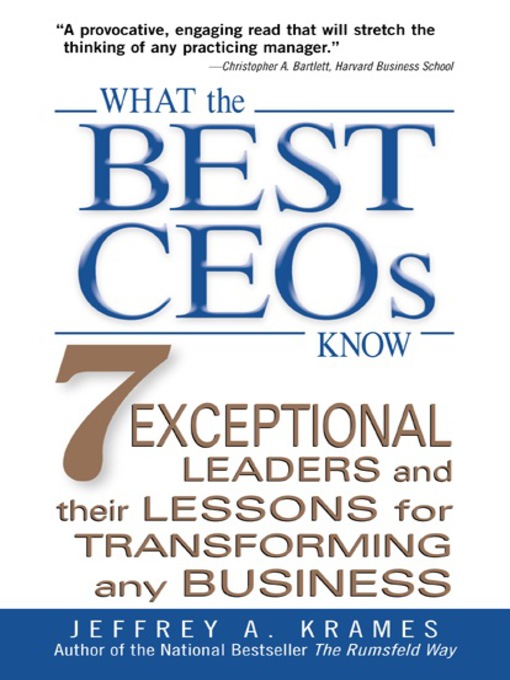
What the Best CEOs Know
7 Exceptional Leaders and Their Lessons for Transforming any Business
کتاب های مرتبط
- اطلاعات
- نقد و بررسی
- دیدگاه کاربران
نقد و بررسی

May 5, 2003
In his opening remarks, Krames identifies the "celebrity CEO." This person is the company leader who's "idealized, even idolized," whose image graces magazine and book covers, and who is often asked to weigh in on the issues of the day. Celebrity CEOs ran wild in the 1990s and early 2000s. Alas, says Krames, v-p and publisher of McGraw-Hill's business books division, the celebrity CEO's era has ended. But some champion CEOs of that time do have wisdom to impart, and in this thorough and thoughtful examination of successful leadership strategies, Krames dissects the ideas of some of the biggest names that have graced business headlines in the past 10 or so years. The list is impressive: Michael Dell (Dell Computer), Jack Welch (GE), Lou Gerstner (IBM), Andy Grove (Intel), Bill Gates (Microsoft), Herb Kelleher (Southwest Airlines) and Sam Walton (Wal-Mart). Although only one of the subjects still holds the CEO title, all seven have implemented world-famous success methods. Krames pinpoints their defining traits (e.g., they are evangelical, but not necessarily charismatic) and strategies (e.g., prepare for change; foster learning), using specific examples and quotes. Sidebars (entitled "What Would Andy Grove Do?"; "What Would Jack Welch Do?" etc.) break up the text. This is a smart, timely book that deserves reading for the lessons it teaches and for the business history it inadvertently imparts.

April 15, 2003
Do seven of the most admired, most studied, and most quoted CEOs in the twenty-first century have no new knowledge to impart about their successes? Krames has created a new spin for the lessons from names such as Michel Dell and Jack Welch (plus five others) by fashioning a case-history-like approach. He sets the stage by isolating the six traits critical to great CEO success, from instilling a company-wide outside-in perspective to understanding the role of culture and how difficult it is to bring about meaningful cultural change. Then each of the seven CEOs is "assigned" a specific lesson. For example, Southwest's success in creating a performance-driven culture is introduced by a fictional business problem, headlined "What Would Herb Kelleher do?" and followed by a history of the airlines, the problem's answer, additional questions, and a synopsis of points to remember. Post-Enron, any corporate captain of industry can be tarnished; on the other hand, these lessons could remain valuable for years to come.(Reprinted with permission of Booklist, copyright 2003, American Library Association.)

























دیدگاه کاربران